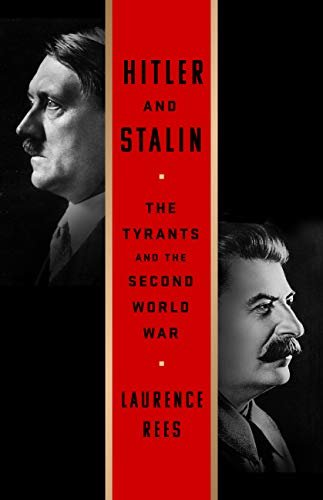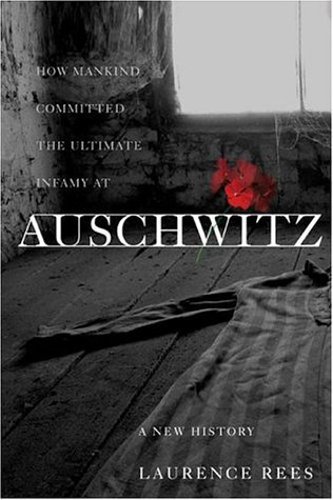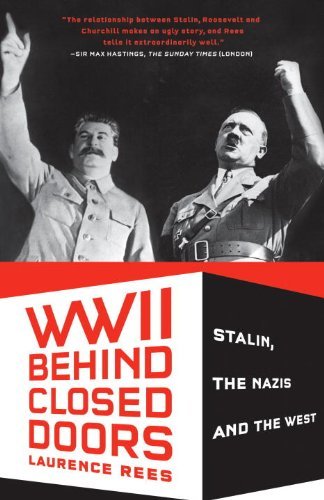Laurence Rees
Laurence Rees is Creative Director of History Programs for the BBC and author of five books, including The Nazis: A Warning from History and Horror in the East: Japan and the Atrocities of World War II. He lives in London.
"Laurence Rees casts new light on how Auschwitz was created and developed into the ultimate place of horror, the lasting symbol of Nazi inhumanity. This admirable book deserves to be widely read. " —Ian Kershaw, Author of Hitler: 1889-1936 Hubris and Hitler: 1936-1945 Nemesis
News
Laurence Rees is working on his new book, Inside the Nazi Mind, which will be published by PublicAffairs.
Books
Hitler and Stalin: The Tyrants and the Second World War
An award-winning historian plumbs the depths of Hitler and Stalin's vicious regimes, and shows the extent to which they brutalized the world around them.
Two 20th century tyrants stand apart from all the rest in terms of their ruthlessness and the degree to which they changed the world around them. Briefly allies during World War II, Adolph Hitler and Josef Stalin then tried to exterminate each other in sweeping campaigns unlike anything the modern world had ever seen, affecting soldiers and civilians alike. Millions of miles of Eastern Europe were ruined in their fight to the death, millions of lives sacrificed.
Laurence Rees has met more people who had direct experience of working for Hitler and Stalin than any other historian. Using their evidence he has pieced together a compelling comparative portrait of evil, in which idealism is polluted by bloody pragmatism, and human suffering is used casually as a political tool. It's a jaw-dropping description of two regimes stripped of moral anchors and doomed to destroy each other, and those caught up in the vicious magnetism of their leadership.
(Public Affairs, February 2021)
The Holocaust
In June 1944, Freda Wineman and her family arrived at Auschwitz-Birkenau, the infamous Nazi concentration and death camp. After a cursory look from an SS doctor, Freda's life was spared and her mother was sent to the gas chambers. Freda only survived because the Allies won the war -- the Nazis ultimately wanted every Jew to die. Her mother was one of millions who lost their lives because of a racist regime that believed that some human beings simply did not deserve to live -- not because of what they had done, but because of who they were.
Laurence Rees has spent twenty-five years meeting the survivors and perpetrators of the Third Reich and the Holocaust. In this sweeping history, he combines this testimony with the latest academic research to investigate how history's greatest crime was possible. Rees argues that while hatred of the Jews was at the epicenter of Nazi thinking, we cannot fully understand the Holocaust without considering Nazi plans to kill millions of non-Jews as well. He also reveals that there was no single overarching blueprint for the Holocaust. Instead, a series of escalations compounded into the horror. Though Hitler was most responsible for what happened, the blame is widespread, Rees reminds us, and the effects are enduring.
The Holocaust: A New History is an accessible yet authoritative account of this terrible crime. A chronological, intensely readable narrative, this is a compelling exposition of humanity's darkest moment.
(Public Affairs, April 2017)
Auschwitz
Auschwitz-Birkenau is the site of the largest mass murder in human history. Yet its story is not fully known. In Auschwitz, Laurence Rees reveals new insights from more than 100 original interviews with Auschwitz survivors and Nazi perpetrators who speak on the record for the first time. Their testimonies provide a portrait of the inner workings of the camp in unrivaled detail—from the techniques of mass murder, to the politics and gossip mill that turned between guards and prisoners, to the on-camp brothel in which the lines between those guards and prisoners became surprisingly blurred.
Rees examines the strategic decisions that led the Nazi leadership to prescribe Auschwitz as its primary site for the extinction of Europe's Jews—their "Final Solution." He concludes that many of the horrors that were perpetrated in Auschwitz were driven not just by ideological inevitability but as a "practical" response to a war in the East that had begun to go wrong for Germany. A terrible immoral pragmatism characterizes many of the decisions that determined what happened at Auschwitz. Thus the story of the camp becomes a morality tale, too, in which evil is shown to proceed in a series of deft, almost noiseless incremental steps until it produces the overwhelming horror of the industrial scale slaughter that was inflicted in the gas chambers of Auschwitz.
(Public Affairs, June 2008)
WWII: Behind Closed Doors
In this revelatory chronicle of World War II, Laurence Rees documents the dramatic and secret deals that helped make the war possible and prompted some of the most crucial decisions made during the conflict.
Drawing on material available only since the opening of archives in Eastern Europe and Russia, as well as amazing new testimony from nearly a hundred separate witnesses from the period, Rees reexamines the key choices made by Stalin, Churchill, and Roosevelt during the war, and presents, in a compelling and fresh way, the reasons why the people of Poland, the Baltic states, and other European countries simply swapped the rule of one tyrant for another. Surprising, incisive, and endlessly intriguing, World War II: Behind Closed Doors will change the way we think about the Second World War.
(Pantheon, April 2009)




